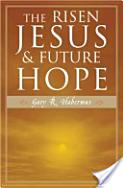Darwinism, like all nontheistic worldviews borrows from the theistic worldview to make its own position intelligible. How so? Darwinists continually emphasize the superiority of reason over faith. Reason requires that the universe is reasonable, which presupposes order, logic, design, and truth. But order, logic, design, and truth can only exist and be known if there is an unchanged objective source and standard of such things.(1) "To say something is unreasonable, Darwinists must know what reasonable is. To say something is not designed, Darwinists much know design is. To say something is not true, Darwinists must know what truth is, and so forth."(2)
Many currently believe that "science is the only sourse of objective truth." While a statement such as this claims to be objective, it is certainly not scientific. The statement is philosophical in nature and cannot be proved scientifically. Therefore, it is self-defeating. In fact there are many truths that cannot be proven scientifically that all rational people accept:
- Mathematics and logic (science can't prove them because science presupposes them)
- Ethical judgments (one can't prove by science that the Nazis were evil because morality is not subject to the scientific method)
- Aesthetic judgments (the beautiful, like the good, cannot be scientifically proven)
- Science itself (ironically, the belief that the scientific method discovers truth can't be proven by the scientific method itself).(3)
This leads us to one of the most important lessons we can learn from considering the scientific arguments against evolution. Science is built on philosophy. In fact, science is a slave to philosophy.(4)
"Bad philosophy results in bad science, and good science requires good philosophy."(5) Norman Geisler and Frank Turek, co-authors of I Don't Have Enough Faith to be an Atheist, offering the following to substantiate this point:
- Science cannot be done without philosophy. Philosophical assumptions are utilized in the search for causes, and therefore, cannot be the result of them. For example, assume (by faith) that reason and the scientific method allow us to accurately understand the world around us. That cannot be proven by science itself. One can't prove the tools of science—the laws of logic, the Law of Causality, the Principle of Uniformity, or the reliability of observation—by running some kind of experiment. You have to assume those things are true in order to do the experiment.
- Philosophical assumptions can dramatically impact scientific conclusions. If a scientist assumes beforehand that only natural causes are possible, then probably no amount of evidence will convince him that intelligence created the first one-celled or any other designed entity. When Darwinists presuppose that intelligent causes are impossible, then natural laws are the only game in town. Likewise, if a creationist rules out natural causes beforehand, then he also risks missing the right answer. However, a scientist who is open-minded to both natural and intelligent causes can follow the evidence wherever its leads.
- Science doesn't really say anything—scientists do. Data is always interpreted by scientists. When those scientists let their personal preferences or unproven philosophical assumptions dictate their interpretation of the evidence, they do exactly what they accuse religious people of doing—they let their ideology dictate their conclusions. When that's the case, their conclusions should be questioned because they may be nothing more than philosophical presuppositions passed off as scientific facts.(6)
The evidence simply does not support the Darwinian worldview or Darwinists would not have to borrow from the theistic worldview to make their case. "Intellect, free will, objective morality, and human rights as well as reason, logic, design, and truth exist only if God exists."(7) Evolution assumes some or all of these realities when articulating their naturalistic view. In short, Naturalists cannot have it both ways.
Endnotes
- Norman Geisler. I Don't Have Enough Faith to be an Atheist. (Wheaton, IL: Crossway Books, 2004), 130.
- Ibid., 130.
- Ibid., 126-127.
- Ibid., 127.
- Ibid., 127.
- Ibid., 127-128.
- Ibid., 132.


























